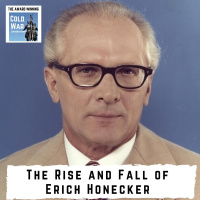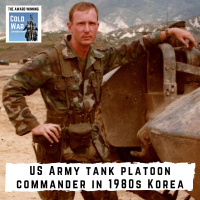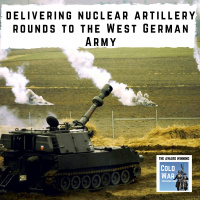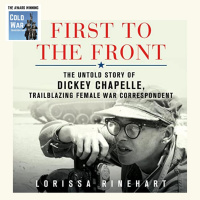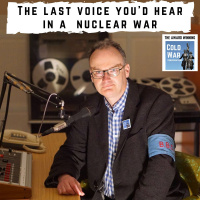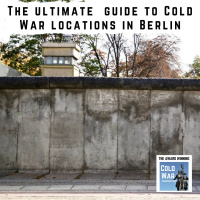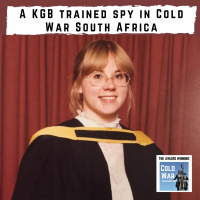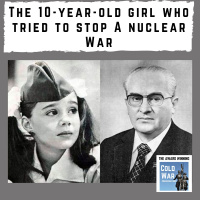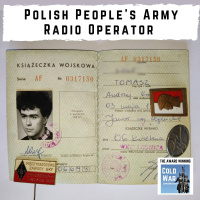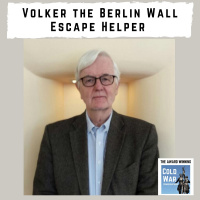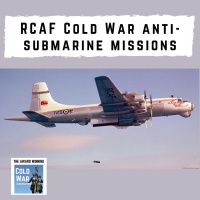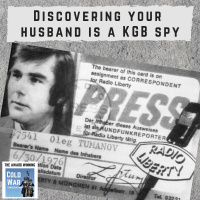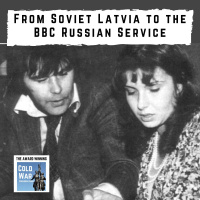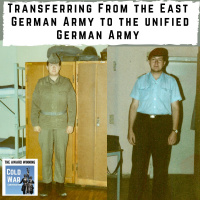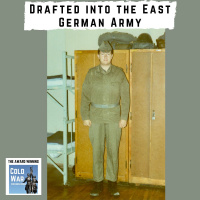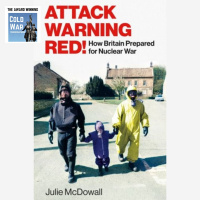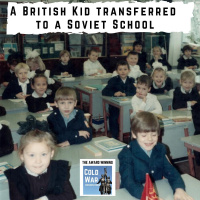Cold War Conversations
- Author: Vários
- Narrator: Vários
- Publisher: Podcast
- Duration: 349:35:31
- More information
Informações:
Synopsis
In conversation with those that experienced the Cold War and those who are fascinated.
Episodes
-
The rise and fall of East German leader Erich Honecker (302)
28/07/2023 Duration: 01h13minHonecker emerged as an ambitious political player and became the shadowy mastermind behind the construction of the Berlin Wall in 1961, a crucial moment in twentieth-century history. Author Nathan Morley brings to life the story of the longtime leader of the German Democratic Republic. Drawing from a wealth of untapped archival sources – and firsthand interviews with Honecker’s lawyers, journalists, and contemporary witnesses – Morley paints a vivid portrait of how an uneducated miner’s son from the Saarland rose to the highest ranks of the German Communist Party. Having survived a decade of brutality in Nazi prisons, and frequently on the verge of being relegated to obscurity, he managed to overthrow strongman Walter Ulbricht at the height of the Cold War and reigned supreme over the GDR between 1971-1989. However, by 1980, the Honecker honeymoon was on the wane as a decade of economic and social difficulties blighted the GDR. Then, as tumultuous changes swept through the Soviet bloc, everything in and aroun
-
US Army tank platoon commander in 1980s Cold War Korea (301)
21/07/2023 Duration: 01h02minTom Sullivan was a tank platoon commander in Korea in the early 1980s responsible for six tanks and their crew We hear why he joined the US Army, his training, and his first impressions of Korea in the Winter of 1982. He is assigned to Second Platoon, C Company, 1-72 Armor under the toughest Company Commander in the Brigade who had very high standards, no humour, and was a rigid disciplinarian with an uncompromising approach. Tom shares details of his fellow soldiers, including Vietnam veterans, the living conditions He explains the challenges of operating armour where the winter weather is brutal, and the majority of the terrain is hills, mountains, rice paddies, and dirt roads We discuss the threat the North Koreans posed and the scarce hope that reinforcements would arrive in sufficient time should the North Koreans decide to attack. 0:00 Introduction and background of Tom Sullivan 4:56 Training to become an armored officer and the role of international instructors 14:12 Arrival in Korea, transfer to Cam
-
Assembling and delivering nuclear artillery rounds to the Cold War West German Army (300)
14/07/2023 Duration: 44minIn February 1983 US soldier Manuel Alzager was sent to a mysterious posting to the British Zone in the north of West Germany a long way from the main US forces in southern Germany. After a lengthy journey, he is picked up by a West German private and eventually arrives at the 81st USAFAD (US Army Field Artillery Detachment), where his mission is to guard, assemble, and deliver low-yield nuclear artillery rounds to the 7th West German Army Artillery Regiment. He describes how the rounds were assembled as well as their orders in the event of unauthorised intruders. Being stationed in the British Zone of West Germany Manuel also tells us about the love/hate relationship with the Brits where they would fight, make up, drink, and fight again. 0:00 Introduction and overview of the episode 0:55 Manuel Altsaga's experience and assignment in West Germany 13:25 Mission and protocol related to nuclear artillery rounds 21:10 Public awareness and potential spy encounters 24:29 Guard duty and response plan for potential a
-
Dickey Chapelle - trailblazing female Cold War journalist (299)
07/07/2023 Duration: 01h04minNow have you ever heard of Dickey Chapelle? No, I hadn’t either, but I’m delighted to bring you the unknown story of this trailblazing female war correspondent. Dickey’s career started in World War 2 where she reported from some of the Pacific wars’ toughest battlefields of Iwo Jima and Okinawa. During the Cold War, she reported from Hungary during the 1956 Uprising and was held in the infamous Fő Prison and interrogated by the Hungarian security forces. Dickey went on to report from the struggle of the Algerian Liberation Front covering their campaign against French colonial rule as well as becoming the first Western female reporter to march with Castro’s Cuban Revolutionary Army. She was the first woman to be given permission to para drop with the 82nd and 101st Airborne Divisions' first correspondent to live with anti-communist guerrilla forces in the Mekong Delta. Later, she would become the first female reporter to go on patrol with the First and Third Battalions of the Seventh Marines Regiment which wer
-
The Cold war ice hockey team that fought the Soviets for the soul of its nation (298)
30/06/2023 Duration: 01h24minI speak with author Ethan Scheiner whose book “Freedom to Win” describes the gripping story of a group of small-town young men who would lead their underdog hockey team from Czechoslovakia against the Soviet Union, the juggernaut in their sport. In 1968 Czechoslovakia experienced the Prague Spring, an attempt to moderate and soften communism. However, a sudden invasion by 500,000 Warsaw Pact soldiers halts the reforms. We hear the inspiring story of how the young players of the national hockey team battle the Soviets on the ice to keep their people’s quest for freedom alive and forge a way to fight back against the authoritarian forces that sought to crush them. 0:00 Introduction and background on the episode's guest 2:51 Background on the Holik family and their struggle under the Nazi occupation 9:37 The unique situation of army teams in Czechoslovakia and the Holik brothers' involvement 15:50 Yaroslav Holik: A superhero in Czechoslovakia 23:23 The heated 1967 World Championships match between Czechoslovakia
-
The last voice you'd hear in a nuclear war (297)
23/06/2023 Duration: 49minThe BBC Wartime Broadcasting Service (WTBS) is a little-known piece of Cold War history that would have been for many the last human voice they heard after a nuclear attack on the UK. Iain started work for the BBC in 1988 and due to the pressure on training space, was trained in the nuclear bunker at BBC Wood Norton. After training he went to Broadcasting House in London where he first encountered some of the technical infrastructure the WTBS would use. Iain did a spell in the main control room and recalls the red phone which was the link from Whitehall to initiate the BBC War Book. Over time Iain has collected knowledge on all aspects of the WTBS and he shares details of where it would have been broadcast from, what would have been heard, and who, in the event of an attack, would have descended into the bunkers to broadcast it. Iain also delivers a talk on the subject. There are more details on this link. https://speakernet.co.uk/talk/4000/the-bbc-the-bomb-cold-war-broadcasting-from-the-bunkers Hack Green Nu
-
The ultimate guide to Cold War locations in Berlin (296)
20/06/2023 Duration: 01h14minJonny Whitlam has been a Berlin tour guide since 2010, and since then he’s been showing travellers from across the world the fascinating history of Berlin. We met via social media after I noticed his great videos describing well-known and lesser know 20th-century historical locations in Berlin. We discussed doing an episode to help you see Cold War Berlin sites without needing a tour guide and this episode is the result. However, if you would like a personal tour check out Jonny’s tours on this link. Book your Berlin private tour experience now (whitlams-berlin-tours.com) Jonny is keen to share Berlin’s amazing history with everyone and he has put together The Ultimate Guide to Cold War Berlin which includes an amazing Google map of Cold War sites in Berlin. Despite the name, this list is not exhaustive and we’d welcome suggestions for anything you think we have missed! 0:00 Introduction and guest introduction: Johnny Whitlam 2:21 Interview with Johnny Whitlam: His experience as a tour guide and significant C
-
A KGB trained spy's desperate escape from Cold War South Africa (295)
16/06/2023 Duration: 54minSouth Africa in the 1980s is a brutal, racist Apartheid regime. Those who oppose it risk their lives. Apartheid was a system of institutionalised racial segregation that existed in South Africa from 1948 to the early 1990s Sue Dobson is moving easily through the echelons of the racist government in her work as a journalist, whilst concealing her espionage and military training in the Soviet Union, and her intelligence work for the banned African National Congress. She interviewed Apartheid ministers and had a honey trap affair with a police chief involved with the Namibian independence process. However, Sue's cover is blown leading to her desperate flight across Southern Africa with the Apartheid security police snapping at her heels. We hear in detail about her tense three day car journey to the Soviet Embassy in Botswana and how her KGB training saved her life… 0:00 Introduction and Sue Dobson's Espionage Journey 2:22 Sue's Role in the South African Bureau of Information and Namibia's Independence 8:21 Sue
-
A KGB trained spy in Cold War South Africa (294)
09/06/2023 Duration: 50minSouth Africa in the 1980s is a brutal, racist regime. Those who oppose it risk their lives. Sue Dobson, was a young white South African woman who was also a spy for the banned African National Congress. The ANC was a liberation movement known for its opposition to apartheid In the 1980s she built a legend, a fake persona where she pretends to conform, moving easily through the echelons of the racist government in her work as a journalist, whilst concealing her espionage and military training in the Soviet Union, and her intelligence work. We begin with her childhood and what life was like under apartheid. Sue then describes her journey to joining the African National Congress, her recruitment into the armed wing, and her training in the Soviet Union. 0:00 Introduction and brief history of apartheid 0:31 Sue Dobson: Life as a spy for the ANC 8:35 Geopolitical outlook of South Africa during the Cold War 15:40 Sue Dobson's initial contact with the ANC and her training 24:38 Living a lie permanently and returning
-
The 10 year old girl who tried to stop a nuclear war (293)
02/06/2023 Duration: 01h12minIn November of 1982, at the height of the Cold War, Samantha Smith, a 10-year-old girl from Manchester, Maine, wrote to the Soviet leader Yuri Andropov and asked him if he was going to wage a nuclear war against the U.S. When an unprecedented response from Andropov arrived, and Samantha received an invitation to visit the USSR, she and her family embarked on a journey that brought the two warring nations closer together. We speak with author Lena Nelson who was born in the Soviet Union and has spent the past 15 years researching and documenting the story of Samantha Smith and creating an archive at https://www.samanthasmith.info/. Lena reveals how Samantha Smith's journey in the summer of 1983 helped melt the hearts of the Soviets and thaw the ice of the Cold War. We talk about the interviews she conducted in both the US and Russia with key players in the events of those days and tell the story of this unprecedented moment in history. 0:00 Introduction and interview with author Lena Nelson about Samantha
-
Cold War Polish People Army Radio Operator (292)
26/05/2023 Duration: 56minCommunist Poland had universal conscription and the armed forces were huge by contemporary standards. The Polish People’s Army, Navy, and Airforce had just over 400,000 troops for most of the 1980s in a country of 36 million. Tom was a conscript in Polish People's Army from 1987-89. He served as a radio operator in Legnica for the rocket artillery. His service was at an interesting time when the communist dominance ended as Poland began to embrace democracy in its first free elections before World War 2. Tom shares details of his conscription process, selection, and initial training. We also hear of training exercises, attempts at political indoctrination, and his role if the Cold War had ever turned hot. I’m very keen to expand our library of Warsaw Pact voices, so if you know of any other English speakers who served in the Warsaw Pact Forces during the Cold War do let me know. 0:00 Introduction and background of Polish military conscription 5:18 Issuance of army book and process for students aspiring f
-
Volker the Berlin Wall Escape Helper (291)
19/05/2023 Duration: 01h19minIt’s 1966 in Berlin and the city has now been divided for 5 years by an almost impenetrable wall erected by the communist German Democratic Republic. Together with his friends, West German student Volker Heinz joins a group looking for ways to help would-be fugitives escape from East to West. Their search ends at Checkpoint Charlie, the most heavily secured border crossing of the Berlin Wall. By hiding the fugitives in the trunk of a diplomat's car, Volker Heinz helps East German citizens flee to the West. However, the Stasi picks up his trail, and Volker is arrested and interrogated. We hear in detail about his time in prison, including the interrogations and fellow cellmates. Following secret negotiations and a show trial where he is sentenced to 12 years imprisonment, Heinz is eventually swapped for two Soviet spies. In 2001 Heinz initiated the German-British foundation Temple Gift dedicated to the reconciliation of former foes Britain and Germany. In 2012 he was awarded the Federal Order of Merit in recog
-
Cold War Canadian airborne anti-submarine missions (290)
12/05/2023 Duration: 39minColonel Terry Chester’s flying career spanned some 42 years, and 10,000 flying hours. He joined the RCAF in Sept 1964 and in 1968 was awarded Navigator Wings. Terry flew for 3,000 hrs on the Argus Maritime patrol aircraft where he spent a good portion of his RCAF career hunting for Soviet Submarines in both the Pacific and Atlantic areas of operation. He was instrumental in the design criteria for sub-hunting capability when Canada procured the new Aurora, for anti-submarine hunting in the early 1980s. Terry reveals sub-hunting tactics as well as details of Canadian participation in NATO exercises. Among other stories, he describes how he accidentally attacked a US nuclear submarine, the perils of landing in Gibraltar, and Soviet sub-incursions into Canadian waters. He also recalls airborne meetings with Soviet aircraft and a trip in the British nuclear submarine HMS Churchill. 0:00 Introduction to Cold War Conversations with Colonel Terry Chester 2:24 Overview of Chester's experiences in Anti-Submarine War
-
Discovering your husband is a KGB spy (289)
05/05/2023 Duration: 01h06minThe second part of Svetlana’s story starts shortly after her arrival in West Germany with her husband Oleg who is the Chief Editor of the Russian Service of Radio Liberty a CIA-financed station beaming Western propaganda into the Soviet Union. Listen to the previous episode here https://coldwarconversations.com/episode288/ To Svetlana’s horror, Oleg reveals that he has been working for the KGB for 14 years. Svetlana is now trapped. She is in a quandary. Should she betray the man she loves and risk the wrath of the KGB or should she stay loyal to her husband? Loyalty wins out and she is invited by the Americans to teach Russian to intelligence officers and later becomes assistant to the commander at the US Army Intelligence Institute in Munich. However, in 1986 Oleg disappears and leaves Svetlana on her own in West Germany. At a press conference in Moscow, he reveals his espionage and suspicion falls on Svetlana… 0:00 Introduction and background of Svetlana's story 5:34 Discussion about Oleg's recruitment into
-
From Soviet Latvia to the BBC Russian Service (288)
28/04/2023 Duration: 53minSvetlana came from a dissident Jewish family opposed to Soviet rule in Latvia. Her parents survived World War 2, but during the Stalin era two members of her family were held in the Gulags. The family never resigned themselves to Latvia's occupation by the Soviet Union in 1940. It was almost impossible to legally leave the Soviet Union, however, in 1971 the first opportunities for "Jewish" emigration appeared, and Svetlana, then aged 12 and her family left legally. At the age of 16, she is staying with her Uncle in London when she comes across Bush House, the home of the BBC Russian Service. Svetlana manages to get a job there and begins to get promoted. She meets Georgi Markov who is assassinated by Bulgarian Security Services on Waterloo Bridge in London and later she is introduced to Oleg, the Chief Editor of the Russian Service of Radio Liberty, a CIA-financed station beaming Western propaganda into the Soviet Union. This meeting has a profound effect on her life… 0:00 Introduction and Svetlana's Backgrou
-
Transferring from the East German Army (NVA) to the unified German Army (Bundeswehr) (287)
21/04/2023 Duration: 59minWe continue Steffen’s story where he tells of serving in three armies – firstly, the NVA, secondly the East German Army between the first free elections and unification, and finally the unified Bundeswehr. We start the episode in the Autumn of 1989 where demonstrations are growing against the government in nearby Leipzig and Steffen’s unit is on high alert and confined to barracks. It is clear East Germany is on the cusp of change however, what will be the impact on Steffen and his comrades? Steffen describes these tense days when rumours abounded of military action against the demonstrators, as well as how he heard about the fall of Honecker and the opening of the border. We also hear about his experiences as the NVA transitions after the first free elections in East Germany and momentum builds for reunification. Steffen accepts a place in the new unified German army and we hear about the day command is handed over to the Bundeswehr and how he has to learn a different way of thinking, such as the new doc
-
Drafted into the East German Army (286)
14/04/2023 Duration: 52minSteffen was born in Karl Marx Stadt and was conscripted into the NVA (East German Army) in 1988. When he left school he started an apprenticeship in electronics learning how to build radio receivers at REMA, a then-famous producer of HiFi equipment. Steffen is called up at 18 for his 18 months of service and he talks of the conscription process and incentives offered to him to serve for a longer period. Steffen is posted to a unit in Leipzig that was responsible for telephone lines from the NVA Headquarters for the area south of Berlin. He describes the training he took and the role he carried out including installing phones for NATO Intermediate-Range Nuclear Forces Treaty inspectors. In the summer of 1989 many citizens of East Germany flee the country via the now semi-open Hungarian border and Steffen describes heightened tension within the Army. Don’t miss next week’s episode where Steffen describes his transfer into the Bundeswehr, the West German Army. 0:00 Introduction and guest presentation 2:36 Steff
-
How Cold War Britain prepared for Nuclear War (285)
07/04/2023 Duration: 01h17minDuring the Cold War, the awesome power of nuclear weapons and its deadly fallout meant that every town, village and home in Britain fell under the nuclear shadow, and the threat of annihilation coloured every aspect of ordinary life. I chat with author and fellow Cold War podcaster Julie McDowall about her new book Attack Warning Red!: How Britain Prepared for Nuclear War. We discuss how families were encouraged to construct makeshift shelters with cardboard, plastic sheets and sandbags, as well as how vicars and pub landlords learnt how to sound hand-wound sirens, offering four minutes to scramble to safety. and the thousands who volunteered to give nuclear first aid, often consisting of breakfast tea, herbal remedies, and advice on how to die without contaminating others. It's a fascinating, haunting and darkly humorous look at the UK government’s attempts to prepare the UK population for nuclear war while bunkers were readied for the officials and experts who, in theory, would ensure life continued aft
-
Beyond the Wall: East Germany, 1949-1990 (284)
31/03/2023 Duration: 01h26minIn 1990, a country disappeared. When the Iron Curtain fell, East Germany simply ceased to be. For over forty years, from the ruin of the Second World War to the cusp of a new millennium, the GDR presented a radically different German identity to anything that had come before, and anything that exists today. Socialist solidarity, secret police, central planning, barbed wire: this was a Germany forged on the fault lines of ideology and geopolitics. I talk with acclaimed historian Katja Hoyer Whose new book Beyond the Wall: East Germany, 1949-1990 offers a kaleidoscopic new vision of this vanished country. Beginning with the bitter experience of German Marxists exiled by Hitler, to the creaking foundations of socialism in the mid-1980s, we discuss that amid oppression and frequent hardship, East Germany was yet home to a rich political, social, and cultural landscape, a place far more dynamic than the Cold War caricature often painted in the West. Powerfully told, and drawing on a vast array of never-before-se
-
A British kid transferred to a Soviet school (283)
25/03/2023 Duration: 51minRichard was 6 years old when he was uprooted from a school in the United States to a Soviet school 700 miles East of Moscow. In 1988 the Soviet Union was opening up following Michael Gorbachev’s policy of Perestroika and American firms began looking at the possibility of trading with the Soviet Union. It was politically and economically sensitive and his family was chosen to be sent to the USSR to open a factory in the industrial town of Nizhnekamsk in Tartarstan. They lived in a special apartment building designated for foreigners and Richard attended the local school. Being thrown in the deep end of a Soviet school was a shock to him and he had to adapt fast, not least by learning Russian. He describes his school experiences and the stark contrasts with his previous life. Despite the difference, he found being six years old in the Soviet Union in all, rather fun. There was a Lunar Park for us to go on rides, war-themed toys like tanks and soldiers even at school, and all sorts of mischief were had. L

